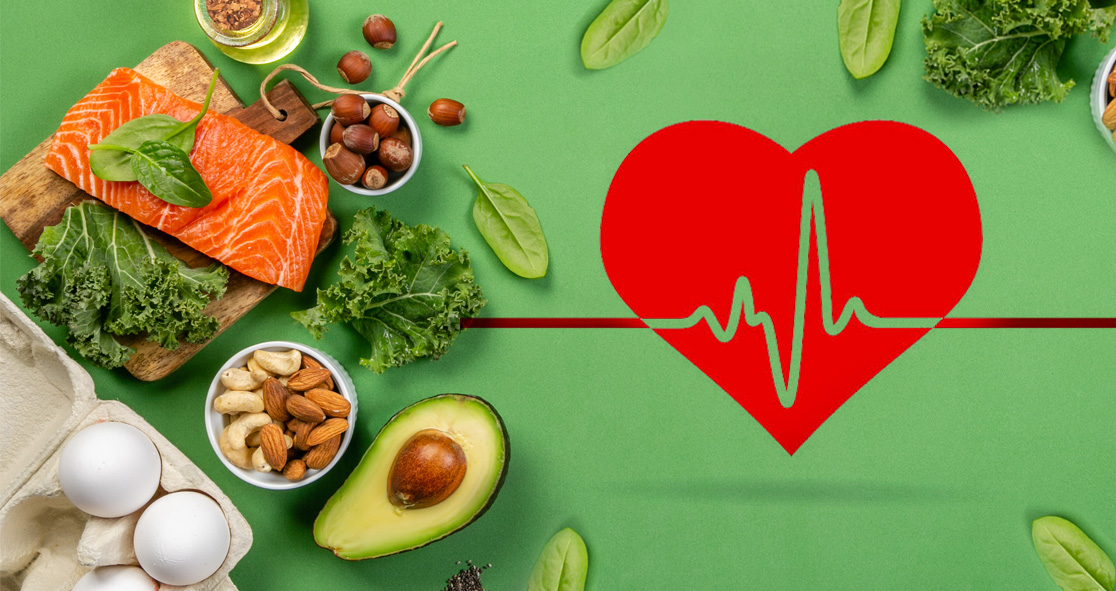
What is a Ketogenic (Keto) diet?
A keto diet is one that is high in fat, with adequate protein, and low carbohydrates (carbs) that forces the body to burn fat instead of carbs for energy. Your body converts carbs into glucose (blood sugar) which is the simplest form of energy for the body to use, so it will use it first. Insulin carries the glucose into the cells for breakdown and energy use. The restriction of carbs will force the body to break down and use fats for energy. The fat breakdown happens in the liver producing ketones, which is what is used for energy instead of glucose. This diet lowers glucose and insulin levels, and shifts the body’s metabolism away from carbs and towards fat and ketones for fuel. Fatty acid metabolism produces more energy and the body uses this energy more effectively. Contrary to the public thinking that a higher fat consumption diet is bad for you, your body is designed for fatty acid metabolism.
What are some benefits to a keto diet?
Supports weight loss
One of the most popular reasons today for following a keto diet is weight loss. It is suggested that this diet, if followed correctly, is comparable to a fasting diet. A keto diet is easier to follow, for longer periods of time than a fasting diet. It suppresses appetite and boosts metabolism while using the body’s fat stores as energy.

Improves heart health
A keto diet has been shown to reduce cholesterol and triglycerides because it inhibits cholesterol synthesis (stops cholesterol from binding). High levels of cholesterol can increase the risk of heart disease and strokes. The ketones produced are a more energy efficient fuel which improve cardiac (heart) work efficiency and function.
Improves brain function and reduces seizures

By: John Voo
This diet appears to create neuronal excitability (an increase in the nerve cells readiness to react) causing a healthier response in brain function. Improved brain function is important for learning and memory. There have been studies showing positive results with keto and epilepsy (seizure disorder), autism (developmental disorder that impairs the ability to communicate and interact), Parkinson’s (a disorder of the central nervous system affecting movement and causes tremors), and Alzheimer’s diseases (affects memory and other mental functions). The metabolism of fat acids create a more efficient use of energy metabolism by the brain and less brain cell destruction and death. It allows alterations in the brain’s metabolism of ketones that develop energy and enhance the ability to control seizures.
Improves type 2 diabetes
A hormone called Leptin (the energy regulator) is increased, allowing a steadier metabolism. Glucose and insulin are decreased due to the lack of carbs. This causes the body to be more sensitive to its own insulin production.
There is some misconception that producing ketones on this diet means the diabetic person is in diabetic ketoacidosis (DKA-a dangerous diabetic complication). This is however different in that DKA is a poorly controlled diabetic that goes into acidosis producing ketones, but their pH is off. In diet-controlled keto acidosis you produce ketones but have a normal blood sugar and therefor a controlled pH.
What are the adverse effects?
Muscle cramps, headaches, dizziness and fatigue are some side effects in the beginning, which is known as the carb detox flu (or the keto flu). You can have bad breath, constipation (due to lack of fiber), diarrhea (from the fat intake), or dehydration (due to the lack of glucose, which is what water binds to). Kidney stone formation is sometimes an adverse effect due to the increase in uric acid (a bi-product of metabolism breakdown) and low pH of the urine, which encourages the formation of the crystals. In some people cholesterol and triglycerides become elevated, which is why monitoring is needed. Due to the regulation of energy is does appear that individuals are at a disadvantage in activities requiring a burst of energy (like high intensity, shorter duration sports). Once carbohydrates are re-introduced into a diet at a normal amount, the weight will likely return.
The long-term negative effects of a keto diet have not been studied.
How to follow a keto diet
You have to drastically cut carbohydrates from your daily diet intake to only 5-10%, increase fat intake to about 75% and consume a moderate amount of protein at about 15-20%. Some basic high fat and low carb foods are meats, fish, poultry, eggs, full-fat dairy and cheese, and low-carb vegetables like; leafy greens, broccoli, cauliflower, Brussels sprouts, tomatoes, mushrooms, and peppers. Try to restrict processed foods and unhealthy fats. Nut butters such as; natural peanut, almond, or cashew butters are better for you. Healthy fat oils are coconut oil, olive oil, avocado oil, and sesame oil. Avocados are a healthy fat and can be added to almost any meal.
Some foods to avoid are high carb choices such as; bread, baked treats, sweets, sweetened beverages, pasts, grains, starchy vegetables, beans, and most fruits. You are allowed low-carb fruits in moderation such as berries. Unhealthy fats to avoid are margarine, vegetable oils, processed or packaged foods such as; hot dogs and lunch meats. Watch certain diet foods for preservatives, sugar alcohols, and aspartame which are unhealthy for you. Eating too much protein can also interfere with a ketosis state.
Recommendations when starting a keto diet
Consult your primary care physician or a licensed professional such as a dietitian. Get baseline labs and regular follow-up lab work performed. Take vitamin supplements and drink plenty of non-calorie fluids such as; water, tea, and coffee without any sweeteners. If you cut out carbs and sugars in steps, the diet is more sustainable. Once you get into ketosis, you have to maintain it in order to gain the benefits. Get ketone test strips to check if your in ketosis (there are blood test strip machines and urine test strips).

By: Leonardo Pires
References
Diet Doctor. (2018, Jan 9). A keto diet for beginners. YouTube. https://youtube.com/watch?v=zrRDnLJdjmQ
Dr. Boz. (2018, August 8). Keto for beginners, how do I start a ketogenic diet?. YouTube. https://www.youtube.com/watch?v=IHYL9L71O2c
Fenasse, R., & McEwen, B. (2019). The Ketogenic diet: a brief report. Journal of the Australian Traditional-Medicine Society, 25(1), 23–24.
Gildea, M. (2017). The ketogenic diet: A summary. Nutritional Perspectives: Journal of the Council on Nutrition, 40(4), 5–9.
Harvard Health Publishing. (n.d.). Should you try the keto diet? Retrieved May 5, 2020, from https://www.health.harvard.edu/staying-healthy/should-you-try-the-keto-diet
Miller, L. (2018). The ketogenic diet for neurological and epileptic conditions. Nutritional Perspectives: Journal of the Council on Nutrition, 41(2), 26–27




Hi Paulette,
I thought your post about a ketogenic diet was very informative! You listed facts about the diet and important health benefits. The videos used were also a good choice. Both from medical professionals talking about what a ketogenic diet is and how do you begin it. Besides having the videos, you also talked about what foods are considered carbohydrates, fats, and proteins and what to avoid. You also listed some of the negative things about a ketogenic diet. It is good to consider all the information provided to decide which diet may be right for you. Information about how it affects glucose and insulin production is important for diabetics that may want to attempt this diet as well. It might alleviate some fears they may have about it. Overall I believe this was a good blog post!
Paulette,
I loved this post! It is filled with so many visuals, which helps with the amount of words, and the video. This was very informative. I have a coworker that went keto to lose weight and actually lost over 20 pounds. This blog was very organized and each category flowed into the other.
Awesome job!
Hi Paulette,
Although I am familiar with the keto diet, and I do live by a higher protein and fat based diet, I did learn a lot from reading through your blog. What studies did you look into to find out that there is a positive correlation between the keto diet and epilepsy? What kind of positive results come from eating a keto diet with the diagnosis of epilepsy? I have several patients who have been diagnosed with seizure disorders. They do have vagus nerve stimulators. However, the effects of the seizures when they do have them take quite a while to clear (and sometimes not at all), resulting in severe weakness, confusion, etc. I hope to see more research on this subject in the future to assist with the diagnoses that you mentioned, as I think it would help my patients as well! Thank you for sharing!
Hi Lauren,
There are so many studies on a keto diet and seizure disorders. They have been using this diet for children with seizures since the early 1900’s.
Paulette, You did a phenomenal job with your blog I applaud you! Very informative and I can tell you put a lot of work into this. I am all about health and everything you included in your post is spot on. I love the visuals you added and you post to put together well. thank you for sharing all of this great information on the “Keto diet”
Hi Paulette! This is my favorite blog post, you did a great job! It is so clear, informative, and easy to follow along with. I actually have been doing keto for over a year now and know a lot about it. From a consumer perspective, this is definitely a post that would appeal to me! The visuals are beautiful also.
Great work